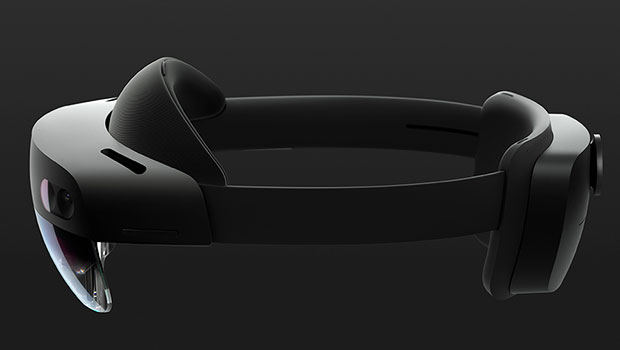Microsoft CEO Satya Nadella on Monday defended the company’s US$479 million contract with the U.S. military — a commitment that some Microsoft employees strongly opposed.
While pledging to engage with employees and consider Microsoft’s role as a corporate citizen, Nadella said the company would not withhold technology from institutions in democracies elected to preserve the freedoms of their citizens. He made the remarks in an exclusive interview with CNN Business at the Mobile World Conference in Barcelona, Spain.

Microsoft was awarded the nearly half-million dollar contract last fall for an “Integrated Visual Augmentation System” using HoloLens technology. HoloLens is used in augmented reality glasses that allow viewers to see the real world overlaid with live information graphics.
The contract calls for more than 100,000 of the systems to be delivered to the military to provide its forces with “increased lethality, mobility and situational awareness” in combat.
Some HoloLens headsets already have been delivered to the Israeli military, where they’re used to help commanders visualize combat situations and to enable field medics to communicate with physicians, according to CNN.

Workers 4 Good
Nadella’s defense of the military contract came days after a group of Microsoft employees, calling themselves “Workers 4 Good,” protested the deal through a letter published on Twitter.
“We are a global coalition of Microsoft workers, and we refuse to create technology for warfare and oppression,” the group noted.
“We are alarmed that Microsoft is working to provide weapons technology to the U.S. Military, helping one country’s government ‘increase lethality’ using tools we built,” the letter states. “We did not sign up to develop weapons, and we demand a say in how our work is used.”
While the group acknowledged that Microsoft previously has licensed technology to the military, the company never before crossed the line into weapons development, it maintained.
“With this contract it does. The application of HoloLens within the IVAS system is designed to help people kill,” the letter states. “It will be deployed on the battlefield, and works by turning warfare into a simulated ‘video game,’ further distancing soldiers from the grim states of war and the reality of bloodshed.”
In its letter, the group demanded Microsoft cancel the IVAS contract, cease developing weapons technologies, create an acceptable-use policy barring the company’s technology from being used in weapons systems, and appoint an ethics review board to enforce and validate compliance with the no-weapons policy.
Weapon or Not?
Not everyone agrees that the IVAS contract is for a weapons system.
“From what is known of the contract, there is nothing inherently ‘weaponized’ about the intended HoloLens usage, although tangentially it could be leveraged in that way,” said Eric Abbruzzese, senior analyst with ABI Research, a technology advisory company headquartered in Oyster Bay, New York.
“The initial publicly available info framing it from a soldier-safety standpoint goes a long way to distancing the contract from a weapons related area,” he told TechNewsWorld.
The contract isn’t as far removed from Microsoft’s current business as the W4G group has contended, Abbruzzese also noted.
“It’s too early to say how exactly the company’s plans may shift going forward, but for this specific project I don’t believe it is far from existing engagements,” he said.
The U.S. military has been using Xbox controllers for some of their systems for years, and it also uses Windows-based systems, Abbruzzese pointed out.
“For Windows, there can be a comfortable distance from weaponry, but HoloLens may veer too close,” he said.
While there isn’t anything confirmed to suggest a weaponized HoloLens system, considering the vague public details about the contract, it could be expanded in that direction, Abbruzzese said.
Listening but Not Backing Down
While Nadella pledged to listen to employees, it seems doubtful Microsoft will be backing out of the HoloLens deal.
“The group of protesting employees is small, at least at present,” Abbruzzese observed. “The only way a notable impact happens is when there’s a much larger and more significant employee response, such as a strike or protest on a large scale.”
The composition of the protest groups matters, too, noted Charles King, principal analyst at Pund-IT, a technology advisory firm in Hayward, California.
“Frankly, the opinions of key executives and senior engineers are likely to outweigh clerical staff and knowledge workers,” he told TechNewsWorld.
Employee activism can be somewhat dangerous for a high-tech company, though, according to Rob Enderle, principal analyst at the Enderle Group, an advisory services firm in Bend, Oregon.
“Policy should typically be set at the top of the company, not at the bottom,” he told TechNewsWorld.
The employees also may be unschooled about today’s high-tech business landscape.
“There is no a single U.S. tech company that doesn’t sell into the military or aerospace in one form or another, especially when you get down to software and hardware,” said Jim McGregor, principal analyst in the Phoenix, Arizona, offices of Tirias Research, a high-tech research and advisory firm.
“Any new technology is likely to be used by governments,” he told TechNewsWorld. “It’s natural.”
King found some irony in the protest.
“I have to say there’s more than a little irony when complaints are coming from employees of a firm that has long made tens of millions of dollars annually from military simulation games,” he said.
“Not to put too fine a point on it, but it’s worth asking who was complaining as games like Halo, Gears of War and Sniper Fury were rising to prominence?” King asked.
Winning a Better ProcessThe protesting Microsoft employees may not be able to reverse the IVAS agreement, but they may change how their company looks at these kinds of agreements in the future.
“The biggest change that could result from this is a more objective and transparent approach to military contracts that could veer into aggressive/weaponized usage,” Abbruzzese said.
“Engaging with employees before the contract is signed and allowing employees a choice in their involvement going forward may become a requirement if protests continue to grow,” he continued. “We saw an initial promise for this already, so a baked-in option for employees may be coming.”
Even if Microsoft changes how it handles military contracts, those contracts will remain attractive to tech companies.
“Working with military agencies and entities is something most IT vendors do willingly or even enthusiastically due to the size and length of contractual agreements,” King said.
“If the aim of those efforts is improving the overall efficiency or effectiveness of a fighting organization,” he continued, “trying to parse the morality of a weapons system contract over deploying tens of thousands of desktop PCs and workstations becomes a rhetorical exercise.”























































